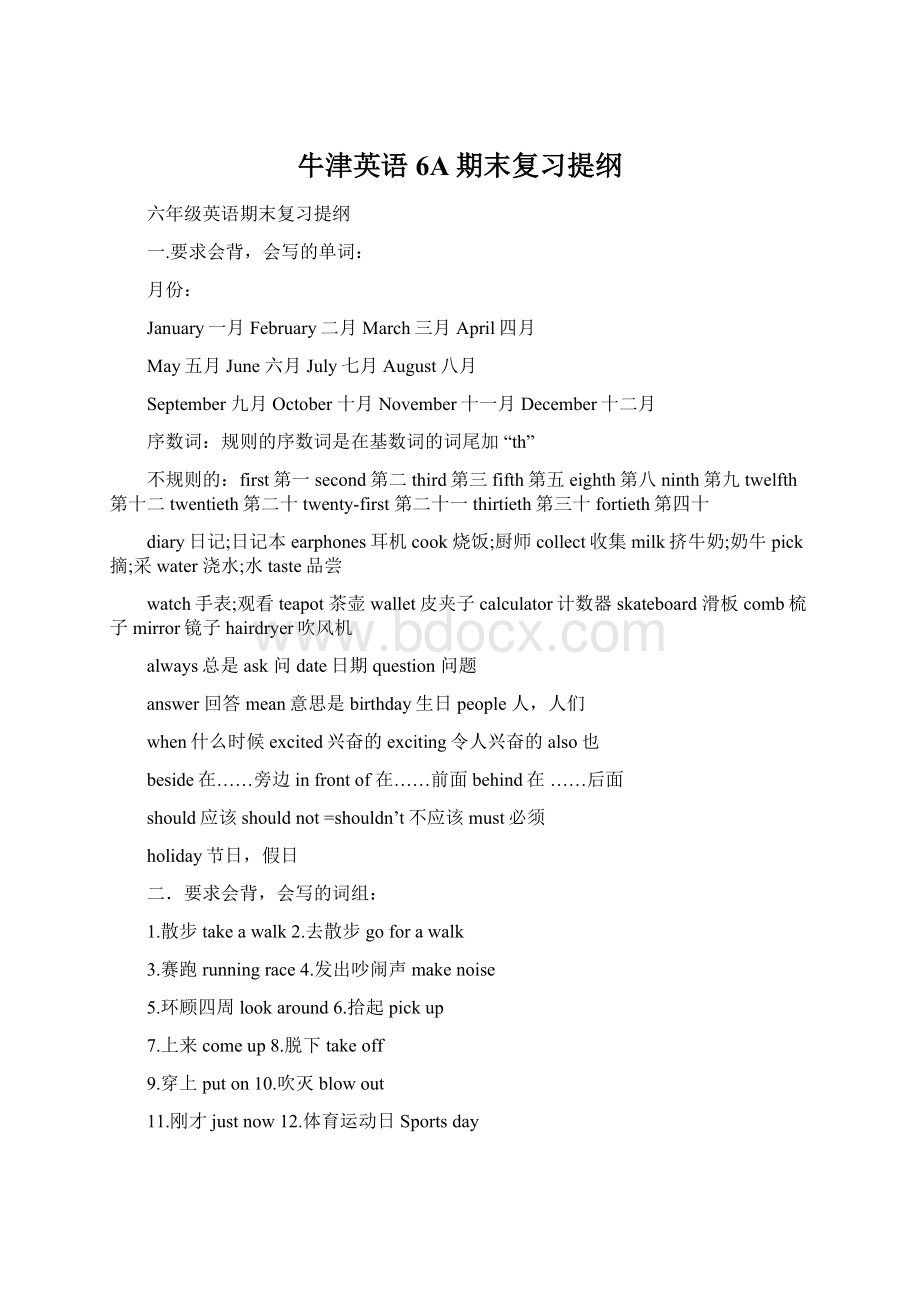牛津英语6A期末复习提纲Word下载.docx
《牛津英语6A期末复习提纲Word下载.docx》由会员分享,可在线阅读,更多相关《牛津英语6A期末复习提纲Word下载.docx(15页珍藏版)》请在冰豆网上搜索。

28.圣诞树Christmastrees29.我有I’vegot=Ihavegot
30.装扮dressup31.吃月饼eatmooncakes32.吃粽子eatricedumplings33.在……后部atthebackof---34.下车getoff35.喜欢喝茶likedrinkingtea36.上车geton37.公共标志publicsigns38.十二岁twelveyearsold39.远离stayawayfrom…
40.在草地上走walkonthegrass41.禁止停车Noparking
42.一张十元钞票aten-yuannote43.禁止吸烟Nosmoking44.禁止乱扔杂物Nolittering45.禁止吃喝Noeatingordrinking
46.不要触摸Donottouch47.禁止践踏草地keepoffthegrass
48.保持安静bequiet49.危险danger50.一起回家gohometogether51.放学后afterschool52.上课前beforeclass53.谈论talkabout54.和某人谈话talkto/with---55.拍照takephotos56.举行一个生日晚会haveabirthdayparty57.寻找lookfor58.一张纸apieceofpaper59.参加聚会gotoparties60.在地上ontheground61.一副眼镜apairofglasses62.一卷胶卷arolloffilm63.在农场onthefarm64.去年lastyear65.上个周末lastweekend66.看电影watchafilm67.参观农场visitafarm68.在一月inJanuary69.浇树watertrees
70.在春节atSpringFestival71.在儿童节onChildren’sDay72.去年一月lastJanuary73.在一月一日onthefirstofJanuary
74.在周末atweekends75.挤牛奶milkcows
76.拜访亲戚朋友visitrelativesandfriends77.收集邮票collectstamps78摘橘子pickoranges.
79.吃许多美味的食物eatlotsofdeliciousfood
80.在野营atacamp81.烧许多食物cookalotoffood82.去野营gocamping83.吃一顿丰盛的晚餐haveabigdinner84.玩灯笼playwithlanterns85.当然ofcourse=sure86.我最喜爱的节日myfavouriteholiday87.梨树peartrees
88.赏月watchthemoon89.过个长假havealongholiday90.看龙舟赛watchdragonboatraces
91.给我一本书givemeabook/giveabooktome
92.向我们展示一些邮票showussomestamps/showsomestampstous
93.给妈妈买一把梳子buyacombforMum
94.作为一件生日礼物asabirthdaypresent
95.一个广受欢迎的节日apopularholiday
96.在学校操场上.intheschoolplayground
三.要求会读,会背,会写的句型:
1.这个标志表示什么意思?
-它的意思是我们不应该吵闹。
-Whatdoesthissignmean?
-Itmeansweshouldn’tmakenoise.
2.现在我能看电视吗?
-不能,你应该做家庭作业。
-CanIwatchTVnow?
–No,youcan’t.Youshoulddoyourhomework.
3.不同的标志表示不同的意思。
Differentsignsmeandifferentthings.
4.-今天是几月几日?
-一月三日。
-Whatdateisittoday?
–It’sthethirdofJanuary.
5.-今天星期几?
-星期三。
-Whatdayisittoday?
–It’sWednesday.
6.-你的生日是什么时候?
-十月二十号。
-When’syourbirthday?
-ItisonthetwentiethofOctober.
7.-你想要什么做生日礼物?
-我想要一个滑板。
-Whatwouldyoulikeasabirthdaypresent?
-I’dlikeaskateboard.
8.-你的日记本在哪儿?
-在书桌上。
-Where’syourdiary?
–It’sonthedesk.
-现在不在那了。
-刚才在那的。
-It’snottherenow.–Itwasthereamomentago.
9.上个星期你在哪?
-我在野营。
-Wherewereyoulastweek?
–Iwasatacamp.
10.昨天你去哪了?
-我去了一个农场。
-Wheredidyougoyesterday?
–Iwenttoafarm.
11.-三天前你干什么了?
-我看望我的叔叔阿姨了。
-Whatdidyoudothreedaysago?
-Ivisitedmyuncleandaunt.
-你还做了什么?
-我看了一场电影。
-Whatelsedidyoudo?
–Iwatchedafilm.
11.什么节日在元旦后面来?
-春节。
-WhatfestivalcomesafterNewYear’sDay?
–SpringFestival.
12.中秋节是什么时候?
-是九月或十月。
-When’sMid-AutumnFestival?
-It’sinSeptemberorOctober.
中秋节人们通常干什么?
-看月亮。
-WhatdopeopleusuallydoatMid-AutumnFestival?
–Theyusuallywatchthemoon.
-去年中秋节你看月亮了吗?
-没有。
-DidyouwatchthemoonlastMid-AutumnFestival?
–No,Ididn’t.
13.这个皮夹子是送给你的。
-非常感谢。
-别客气。
-Thewalletisforyou.–Thankyouverymuch.
–Youarewelcome.
14.这些光盘是谁的?
是我们的。
-WhosearetheCDs?
–Theyareours.
它们是谁送的?
-是我妈妈送的。
-Whoaretheyfrom?
–Theyarefrommymother.
15.-你想来我的生日聚会吗?
-想。
-Wouldyouliketocometomybirthdayparty?
-Yes,I’dliketo.
16.--你最喜欢的节日是什么?
-春节。
-What’syourfavouriteholiday?
-SpringFestival.
17.赛跑很令人兴奋。
Therunningraceisveryexciting.
18.所有的男孩都很兴奋。
Alltheboysareveryexcited.
四.要求会读,能理解的词组和日常交际用语:
1.thesignonthebirds’cage鸟笼上的标志2.pointto指着
3.abigbirthdaycake一个大生日蛋糕-4.walkto走向---
5.folditinhalf把它对半折6.writeamessage写一条信息
7.policestation警察局,派出所8.meetHelen遇到海伦
9.dressupincostumes用戏服装扮10.haveparties举行聚会
11.playolotofgames玩许多游戏12.thismorning今天早上
13.afunnycartoon一个滑稽的卡通片14.gotothesupermarket去超市
15.walkinthemountains在大山里走
16.aVCDofJapanesecartoons一个日本卡通片的光盘
17.singthesong“HappyBirthdaytoyou”toBen对本唱生日快乐歌
18.drawapictureonthecard在卡片上画一幅图
19.alotofquestionsabout…许多关于……的问题
20.spendtimewithmyfamily和我的家人共度时光
21.catchgrasshoppersinthegrass在草丛中捉蚱蜢
22.sitatthebackofthebus坐在汽车的后面
23.Thebusstopped,andsomepeoplegotoff.
汽车停了下来,有人下车了。
24.Iasked,butnobodyanswered.我问,但是没有人回答。
25.Iaskedhimtotakeittothepolicestation.
我请他把它带到警察局。
26.Ilikethecolourverymuch.我非常喜欢这个颜色。
27.Heretheyare.它们在这儿。
28.Let’swaitandsee.我们等着瞧吧。
29.There’snoonenearby.附近没有人。
30.MrGreenistalkingtohisstudentaboutholidays.
格林先生正在跟他的学们生谈论节日。
31.SpringFestivaliscomingsoon.春节快到了
32.SuHaiwantstotakesomephotos.苏海想要拍些照片。
33.–Canyoupickthemupforme,please?
–Sure.
-你能帮我把它们拣起来吗.-当然。
34.Thedoorbellisringing.门铃在响。
五.语法:
(一)
人称代词
物主代词
主格
宾格
形容词性
名词性
I
me
my
mine
we
us
our
ours
you
your
yours
he
him
his
she
her
hers
it
its
they
them
their
theirs
1.“人称代词的主格作主语,如:
I’mastudent.Heisateacher.
2.“人称代词的宾格”常用于动词或介词后,作宾语,如:
Showushowtodrawastar.
WhereisGaoShan?
I’mlookingforhim.
3.“形容词性物主代词”常用于名词前,起限制作用,
如:
yourbook,ourclassroom
(二)
1表示“喜欢”某一类东西:
“like+名词复数”
2表示“喜欢”干某事情:
“like+动词ing”
3表示“想要”某物:
“wouldlike+名词”或“want+名词”
4表示“想要”干某事情:
“wouldlike+to+动词原形”或
“want+to+动词原形”
5表示“能”或“会”干某事情:
“can+动词原形”
表示“不能”或“不会”干某事情:
“can’t+动词原形”
6表示“需要”某物:
“need+名词”
表示“需要”干某事:
“need+to+动词原形”
7表示“努力或尝试”干某事:
“try+to+动词原形”
8问“多少”个某物:
“howmany+名词复数”
9“play”的用法:
(1)play+球,如:
playfootball,playtabletennis
(2)play+the+乐器,如:
playtheguitar,playtheviolin
(3)playwith+玩具,如:
playwithayo-yo,playwithapuppet
playwith+某人如:
playwithme(和我一起玩)
10.动词be的用法:
“am”用于第一人称单数I
“is”用于第三人称单数“he,she,it,Mike,名词单数”,和“this,that”
“are”用于“we,you,they,MikeandTom,名词复数,和“these,those”
11.“therebe”的用法:
(表示某地\某时有某物或有某人)
thereis+名词单数\不可数名词
thereare+名词复数
12.“have,has”的用法:
(表示某人有或某物有)
“has”用于第三人称单数,如“he,she,it,Helen,名词单数”
“have”用于除第三人称单数以外的所有的人称。
13同音词
here–hearright–writesee–seafor–fourno–knowtwo–tooson-sunthere-theirbuy–byyear–ear
pear-pair
14反义词
last-next\firstafter–beforeright-wrong\leftfat-thin
open–closecome–gohere–thereday–night
same–differentloudly–quietlyup–downbusy–free
small–bigcry–laughminus–plusask-answer
15同义词\近义词
gotoschoolonfoot–walktoschoolsure–ofcourse
gotoschoolbybike–ridetoschool
amomentago–justnow
16名词复数
规则的:
(1)直接加“s”,如:
boys,books,photos,-----
(2)以“s,x,ch,sh”结尾的,加“es”,如:
clssses,boxes,watches,,---
(3)以辅音字母加“y”结尾的,变“y”为“i”加“es”,如:
story–stories,city–cities,country–counties,diary-diaries---
不规则的:
foot–feettooth–teethman–men
woman–womenchild–childrenmouse–mice
(mango–mangoeshousewife–housewives)
(三).一般过去时态:
1.意义:
表示过去时间发生的事情或存在的状态。
2.陈述句的句子结构:
主语+动词的过去式
3.动词过去式的构成:
规则的:
(1)直接加ed,如:
played,watched,visited,----
(2)以e结尾的,加d,如:
taste-tasted,like-liked,---(3)以辅音字母加y结尾的,变y为i,加ed,如:
carry–carried
(4)个别双写末尾字母,加ed,如:
stop–stopped,jog-jogged,---
is\am-wasare-weredo-didgo-wentsee-sawsit-satget-gotmeet-methave/has-hadcome-cametake-took
run-randraw-drewdrink-dranksing---sangfly-flewput-put---
(四).现在进行时态
表示事情正在发生或动作正在进行。
主语+动词be+动词的现在分词
3.动词现在分词的构成:
(1)直接加“ing”,如:
doing,cleaning,seeing,----
(2)去掉末尾不发音的“e”,再加“ing”,如:
make–making,have–having,dance–dancing,----
(3)个别动词需要双写末尾字母,再加“ing”,如:
running,swimming,sitting,putting,jogging,getting,beginning,------
(五).一般现在时态:
1.意义:
表示习惯性,经常性的动作,事情.
2.陈述句的句子结果:
(1)主语(第三人称单数)+动词第三人称单数
如:
Mymotherwashesclotheseveryday.
(2)主语(非第三人称单数)+动词原形
Iwashclotheseveryday.
3.动词第三人称单数的构成:
(1)直接加“s”,如:
helps,comes,surfs,-------
(2)以“s,x,o,ch,sh”结尾的,加“es”,如:
does,goes,watches,catches,washes,brushes,-----
(3)以辅音字母加“y”结尾的,变“y”为“i”,加“es”,如:
carry–carries,fly–flies,-----
特殊的:
have–has,
(六)改写句子:
(1)Bendoeshishomeworkatseveno'
clock.
Bendoesn’tdohishomeworkatseveno’clock.(否定句)
DoesBendohishomeworkatseveno’clock?
(一般疑问句)
WhattimedoesBendohishomework?
(对“atseveno’clock”提问)
(2)Theboysplayfootballafterschool.
Theboysdon’tplayfootballafterschool.(否定句)
Dotheboysplayfootballafterschool?
(一般疑问句)
Whatdotheboysdoafterschool?
(对“playfootball”提问)
(3)Helenismakingadressnow.
Helenisn’tmakingadressnow.(否定句)
IsHelenmakingadressnow